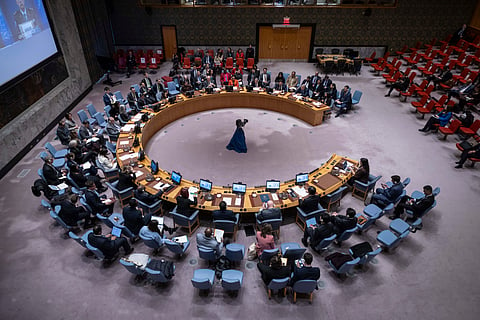

NEW DELHI: India has strongly objected to proposals introducing religion or faith as criteria for representation in a reformed United Nations Security Council (UNSC), emphasising that such parameters are inconsistent with the long-established principle of regional representation.
Speaking at the Inter-Governmental Negotiations (IGN) meeting on ‘Size of the Future Council and Regional Representation’, India’s Permanent Representative to the UN, P. Harish, asserted that introducing new parameters such as religion would derail the foundational principles of the Council’s representation structure.
“Attempts to introduce new parameters, such as religion and faith, as the basis for representation in a reformed Council runs completely counter to regional representation, which has been the accepted basis for representation in the UN,” Harish said in remarks delivered in his national capacity.
Turkish President Recep Tayyip Erdogan has advocated for granting veto power to an Islamic country in the UN Security Council. Pakistan, opposing the addition of new permanent members, supports stronger Islamic representation. Last year, Pakistan’s former UN envoy Munir Akram asserted that the “Islamic Ummah” would reject any UNSC reform proposals that do not include adequate representation for Muslim-majority nations.
He further criticised those resisting text-based negotiations, stating that they are not interested in making real progress. “A reformed Council, with appropriate working methods and accountability mechanisms, would be equipped to function effectively and deliver meaningfully on pressing global issues,” he added.
India also argued that reforms limited to only non-permanent membership would not address the structural imbalance. A consolidated model excluding the expansion of both permanent and non-permanent categories, Harish warned, would only entrench the status quo.
Before his national statement, Harish spoke on behalf of the G4 nations—Brazil, Germany, Japan, and India—reaffirming their joint position that regional representation is the most time-tested and accepted framework. The G4 rejected proposals based on religion, stating: “Proposals to introduce new parameters, such as religious affiliation run counter to established UN practice and add considerable complexity to an already difficult discussion.”
The G4 emphasised that the current UNSC framework is outdated, reflecting a geopolitical reality that no longer exists. “Those who do not endorse real reforms that reflect contemporary realities fall on the wrong side of history, which is detrimental to all of us,” Harish said on behalf of the G4.
Outlining the G4’s proposal, he said the UNSC should be expanded from 15 to 25 or 26 members, with 11 permanent and 14 or 15 non-permanent members. Presently, the UNSC has five permanent members—China, France, Russia, the UK, and the US—and 10 non-permanent members elected for two-year terms.
The G4 (India, Japan, Germany and Brazil) emphasised that UN Security Council reform must include expansion in both permanent and non-permanent categories to address existing imbalances and reflect the aspirations of the developing world, particularly Africa. They urged the start of text-based negotiations with clear timelines.
In contrast, the Uniting for Consensus (UfC) group proposed expanding only non-permanent seats. The Arab Group called for proportional Arab representation, while France reiterated support for G4 countries as future permanent members with veto rights.